<?xml encoding="UTF-8">
By the News@AUC team | This roundup appeared in the Fall 2017 edition of AUCToday.
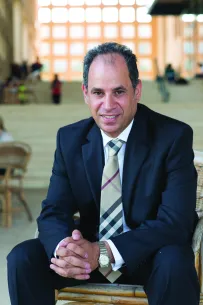
New Provost Ehab Abdel-Rahman
"We have the right people"
This year set in motion with Professor Ehab Abdel-Rahman as AUC's newly appointed provost.
After many years of service at the University, Abdel-Rahman recognizes the distinct qualities that have shaped AUC into the leading global institution it is today and brings a fresh perspective to his new role as provost.
"This is a time for key discussions about the future of the University," Abdel-Rahman said. "I hope to capitalize on the unique opportunity to engage students, faculty, staff and alumni in a deeper dialogue about our structures, policies, processes and, more importantly, our vision for the future of AUC. We have the right people to guide this dialogue."
Abdel-Rahman first joined AUC as assistant professor of physics in 2006. He went on to become chair of the Department of Physics, associate dean of graduate studies and research in the School of Sciences and Engineering, and director of the Yousef Jameel Science and Technology Research Center. As a senior administrator, he held the positions of associate provost for research, vice provost and interim provost. In recognition of his accomplishments, AUC presented him with the Research Innovation Award, Excellence in Teaching Award, Innovative Teaching Award, President's Distinguished Service Award, Outstanding Service Award, and the Provost's Distinguished Service Award.
As provost, Abdel-Rahman envisions boundless opportunities for AUC's growth. "All the challenges that AUC has faced in the last few years have been defining moments and presented opportunities to enhance our operations," he affirmed.
Full story here.
First Female Minister of Tourism
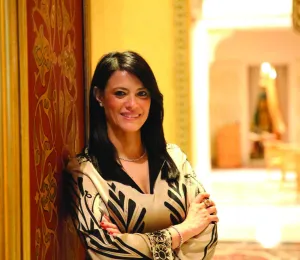
Rania Al-Mashat '95 is Egypt's new Minister of Tourism.
Rania Al-Mashat '95 is Egypt's new minister of tourism -- the first woman in Egypt's history to hold this position since the ministry was established more than five decades ago.
Al-Mashat has always emphasized being driven by a sense of responsibility to serve Egypt. "Every international and domestic post or recognition along my career path better equips me to competently serve my country," said Al-Mashat. "That's my lifelong goal."
A leading expert in monetary policy and international economics, Al-Mashat has worked with prominent financial institutions in Egypt and worldwide since graduating from AUC with a Bachelor of Arts in economics. At the International Monetary Fund (IMF), she served as adviser to its chief economist, Professor Maurice Obstfeld, and as senior economist. She played a key role at the Central Bank of Egypt, where she worked for 11 years and served as assistant sub-governor and head of its Monetary Policy Department. She also acted as a liaison between the bank, sovereign rating agencies and the IMF.
Recipient of the 2013 Distinguished Alumni Award from AUC, Al-Mashat is well-known as a global economist. In 2017, she participated in the World Economic Forum's "Investing in Peace," a panel composed of influential global figures. She was among a list of 10 renowned economics experts whose input was sought for a World Economic Forum article discussing making the world a fairer place. In 2014, the World Economic Forum named her a Young Global Leader for her commitment to bettering Egypt through her impactful work. Al-Mashat's biography is featured in Daughters of the Nile: Egyptian Women Changing Their World (Cambridge Scholars Publishing, 2016).
Al-Mashat noted that her various experiences at AUC exposed her to the international dimension of economics and solidified her decision to pursue her master's and doctorate in the field at the University of Maryland. She also completed executive education certificates in leadership from Harvard and Oxford universities.
During her time at AUC, Al-Mashat was active in numerous extracurricular activities, such as the Cairo International Model Arab League, Cairo International Model United Nations, AIESEC and the Arab Cultural Club. She also participated in the Student Union as the representative for economics majors. In addition, she, along with other AUC students, had the opportunity to represent Egypt at the Bruno Kreisky Forum for International Dialogue in Austria. "These experiences helped build my confidence, trained me in public participation and interaction with others, as well as broadened the networks to which I still have access to this day," reflected Al-Mashat.
Full profile on Al-Mashat here.
AUC Welcomes New Trustees
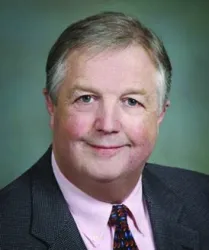
William B. Inglee is the senior partner and cofounder of Inglee Sauer Moseley Strategies.
AUC's Board of Trustees has welcomed two new members: William B. Inglee, senior partner and co-founder of Inglee Sauer Moseley Strategies LLC and a senior adviser at the Center for Strategic and International Studies, and Tarek Masoud, professor of public policy and the Sultan of Oman Professor of International Relations at Harvard University's John F. Kennedy School of Government.
Inglee's career has included senior positions in the private sector, executive branch and United States Congress. Previously, he was clerk and staff director of the Committee on Appropriations in the U.S. House of Representatives. "William Inglee's extensive expertise in foreign affairs will serve as a trusted guide to support AUC's outreach and engagement with the international community," said Atef Eltoukhy '74, chairman of AUC's Board of Trustees.
Inglee holds degrees from Georgetown University's School of Foreign Service and Carleton University's Center for Russian and European Affairs. He has also been awarded the Order of Merit Officer's Cross, First Class, by the president of the Federal Republic of Germany. "It's a great honor to join the Board of Trustees of The American University in Cairo," said Inglee. "I am very much looking forward to working with the other members of the board in supporting and growing the critical educational and leadership position of this incredible academic institution. Egypt is a land and people with a rich history and unlimited opportunity, and The American University in Cairo plays an exceptional role in shaping Egypt's future."
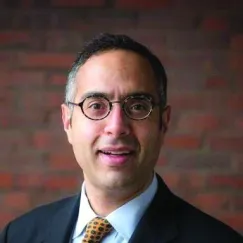
Tarek Masoud is a professor of public policy and the Sultan of Oman professor of international relations at Harvard University's John F. Kennedy School of Government.
With his research focusing on the role of religion in the political development of Muslim-majority countries, Masoud is author of Counting Islam: Religion, Class, and Elections in Egypt (Cambridge University Press, 2014) and co-author of The Arab Spring: Pathways of Repression and Reform (Oxford University Press, 2015). A former Carnegie Scholar, Masoud is also a member of the editorial board of the Journal of Democracy. "As the University embarks on another centennial of excellence, Tarek Masoud's years of dedication to studying the Middle East will enrich AUC's regional and global involvement and standing," said Eltoukhy.
Masoud holds an AB from Brown University and a PhD from Yale University. "As an Egyptian-American," said Masoud, "AUC has always been one of my intellectual lodestars. I have long been in awe of its distinguished faculty, particularly in the social sciences, and I cannot exaggerate the magnitude of what I have learned -- and continue to learn -- from scholarship produced at AUC. It should be no surprise that such a superior faculty produces superior graduates; some of my most distinguished students at the Harvard Kennedy School have been products of AUC. I am humbled and honored to now be part of that institution, and to have the opportunity to do what I can to support its academic mission."
Meet AUC's New Counselor
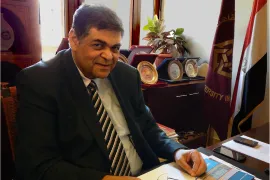
Dr. Hatem has had an extensive career in the field of medicine and nonprofit medical administration.
Dr. Ashraf Hatem, the University's new counselor, has joined AUC after an extensive career in the field of medicine and public and nonprofit medical administration. He was secretary-general of the Supreme Council of Universities and served as minister of health for a five-month term in the months following the 2011 revolution.
Though he earned his medical degree from the renowned Faculty of Medicine at Cairo University, AUC was always a subject of admiration for him. "For me, AUC has a long history and has always been a dream," Hatem said. "I decided to change my career from the public sector to the international nonprofit sector after 30 years, which is something I am excited about."
The role of the counselor is typically liaising between Egyptian authorities and the University. This includes working on continuing to develop good relations between AUC, Egyptian institutions and the Supreme Council for Higher Education, as well as helping to implement the accreditation process for all academic degrees.
Read an interview with Dr. Hatem here.
Palestinian Writer Wins Naguib Mahfouz Medal
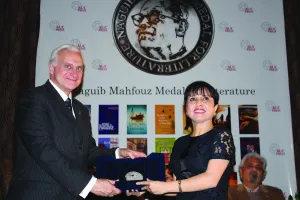
Author Huzama Habayeb's novel Mukhmal, or Velvet, won the 2017 prestigious award.
Palestinian author Huzama Habayeb was awarded the 2017 Naguib Mahfouz Medal for Literature for her novel Mukhmal, or Velvet. The prize is presented annually by AUC Press since 1996.
Set against the backdrop of al-Baq'a refugee camp in Amman, Jordan in the 1970s, Habayeb's novel centers around the lives of Palestinian women and presents a unique narrative of the Palestinian struggle in the post-Naqba generation.
Habayeb sees the novel as a way to reflect on her own identity as the daughter of a Palestinian refugee. "My story rises up on a lofty tower of losses and derives its legitimacy from a staggering legacy of loss, and more loss," she said, upon accepting her award from President Francis Ricciardone. "The women of Velvet are able to capture joy in the midst of oppression, and they desire food and sumptuous fabrics, and wait for only one man, even within a wide space of misery, violation and repression called the 'camp.'"
Full story here.
AUC to establish 20 career centers at 12 public universities
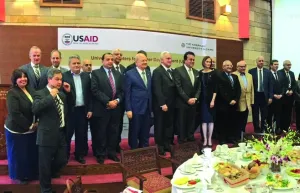
AUC launched the University Centers for Career Development project at a formal breakfast with the stakeholders.
Due to the success of AUC's Career Center and its three pilot Employability and Career Development Centers at Ain Shams and Suez Canal universities, AUC has launched the University Centers for Career Development (UCCD) project. Over the course of four years, the project will establish 20 UCCDs at 12 public universities in Upper Egypt, the Delta and the greater Cairo area, impacting roughly 1 million students -- more than 70 percent -- with funding from the United States Agency for International Development (USAID).
The UCCD project will partner with the International Labour Organization to analyze the needs of the current labor market and help the universities equip students with the required knowledge and skills for the job market. "This is part of the mandate to expand our expertise to build capacities within the community to serve more Egyptian youth and help them prepare for their future careers," said Maha Guindi, executive director of AUC's Career Center.
Some of the universities that will be home to their own sustainable career centers include Ain Shams, Alexandria, Aswan and Mansoura universities. AUC is hiring a team to establish the centers, which will eventually be staffed by career development facilitators and will offer career advising; employment services; workshops on resume writing, the job search and interviewing techniques; employability skills training; and resources from training partners, including AUC's Research Institute for a Sustainable Environment. Minister of Higher Education and Scientific Research Khaled Abdel Ghaffar said that he's looking forward to another beneficial aspect of these centers: establishing entrepreneurial skills.
According to USAID, 3.5 million Egyptians under the age of 30 are unemployed. "If each student who will have access to these 20 centers finds a job through these centers, then this project has the potential to cut Egypt's youth unemployment rate by at least a third and will ensure University graduates are a driving force behind Egypt's economic growth," said Sherry Carlin, director of USAID Mission.
Full story here.
Tech Ties: AUC, Udacity partner on blended learning
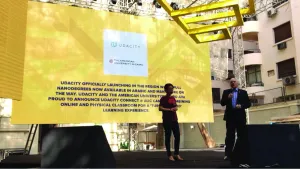
President Francis Ricciardone with Udacity COO Clarissa Shen at the project's launch event.
AUC and online educational platform Udacity are partnering to bring tech curriculum onto campus next year.
President Francis Ricciardone and Chief Operating Officer of Udacity Clarissa Shen announced their partnership at the RiseUp Summit, which saw the active participation of distinguished AUC students, faculty and alumni and where AUC was a "strategic partner" and "first believer."
Connect @ AUC is Udacity's first partnership with an educational institution in Egypt and the Middle East and North Africa region. "We have a certain global brand, and so does Udacity," said President Francis Ricciardone. "Putting us together will be the essence of any great partnership. It's not simply additive ... it's transformative."
Udacity aims to offer AUC students in-person access to events and programs that mirror the company's connect sessions, which are hybrid, blended-learning model courses that connect students with tech companies. The program
will combine online curricula with physical classrooms, with an initial focus on data science and mobile development. These courses allow students to learn skills in demand in the tech industry, according to Shen.
"We want to bring the power of Udacity together with AUC so that we can bring many more amazing industry-relevant training and skills to the AUC community," she said.
Full story here.
Fintech at AUC among first worldwide
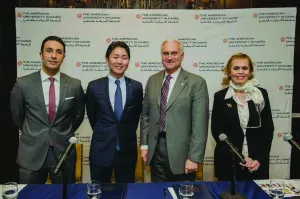
President Francis Ricciardone with representatives from Luqman Weise Capital shortly after signing the memorandum.
AUC signed a memorandum of agreement with Luqman Weise Capital to establish the Luqman Weise FinTech Fellowships Fund. The program will begin admitting students in Spring 2018, offering 14 fellowships for Egyptian students to attend AUC in pursuit of a Master of Science in finance. Additionally, Luqman Weise Capital will be supporting the development of a FinTech concentration at AUC under the Master of Science in finance program -- the first in Egypt and among the first worldwide.
"We will now be able to put a greater emphasis on FinTech and establish the first concentration in degree studies in the region, in Egypt -- thanks to [Luqman Weise Capital] and [its] vision ... to expand [its] industry and grow it in Egypt, and through Egypt, to the entire region," said President Francis Ricciardone.
FinTech, or financial technology, is a growing field garnering interest across the globe. "FinTech is going to change the way finance works," said Mohamed Khater, Luqman Weise Capital's chief investment adviser. "The way we trade, the way we handle money, the way we handle transactions are going to change in the future incredibly."
In addition to helping establish the FinTech concentration at AUC, Luqman Weise Capital has agreed to provide support as the University develops courses and will be bringing in distinguished visiting professors to work with students, as well as train faculty members, in order to build a solid foundation for the program moving forward.
Full story here.
Top Accreditations
AUC's School of Business has been reaccredited by the three most prestigious international business and management education associations: the Association to Advance Collegiate Schools of Business, the Association of MBAs and the European Foundation for Management Development Quality Improvement System. Only 77 business schools -- representing 1 percent of leading business institutions worldwide -- received the three distinguished accreditations, known as the triple crown. Since initially acquiring the triple crown accreditation three years ago, AUC's School of Business became the first in the Middle East and third in Africa to obtain all three renowned recognitions.
Full story here.
AUC's Master of Public Administration and Master of Public Policy are the first worldwide to receive triple crown accreditation in public affairs education by the European Association for Public Administration Accreditation. AUC is the first University to earn this honor outside of the Council of Europe.
Full story here.
For the fourth consecutive time, AUC's computer science and engineering program has been reaccredited by ABET (Accreditation Board for Engineering and Technology). The program was praised for the quality of its curriculum, student creativity and completion of projects, flourishing teaching environments, equipped labs and competent faculty. AUC's computer science and engineering program is the first outside of the United States to receive this recognition since 1999.
Full story here.
The Department of Accounting is now fully accredited by the Association of Chartered Certified Accountants (ACCA) in the United Kingdom and received the maximum exemption of nine out of 14 modules. AUC's undergraduate accounting program is the first in Egypt, Africa and the Middle East to obtain the maximum exemption that ACCA may grant to any accounting program.
Full story here.
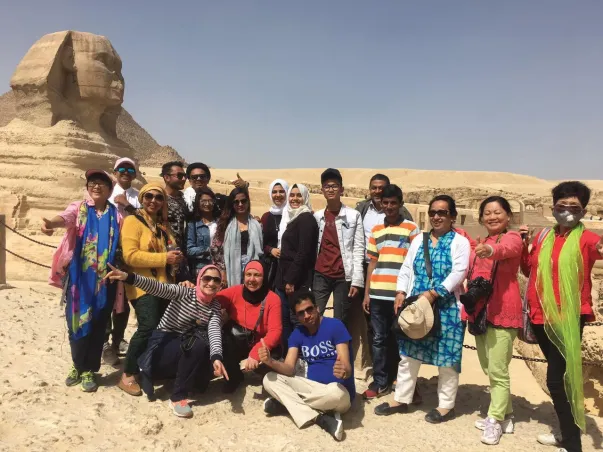 Students in Egypt visiting the Sphinx through the Residential Life Cross-Cultural Program.
Students in Egypt visiting the Sphinx through the Residential Life Cross-Cultural Program.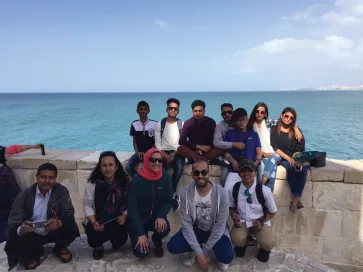 Students from Nepal and from Egypt met and became friends before going to each other's home cities through the Residential Life Cross-Cultural Program.
Students from Nepal and from Egypt met and became friends before going to each other's home cities through the Residential Life Cross-Cultural Program. The trip also offered students a chance to consider what they had learned in classes in real-world situations and to see things from a different standpoint. "As a political science student," reflected Lilia Errahaiem, economics major, "I've studied what might constitute an underdeveloped country. Going to Nepal and seeing things myself was so different; it really changed my political perceptions. In many of my classes, I'm now trying to focus my research on Nepal."
The trip also offered students a chance to consider what they had learned in classes in real-world situations and to see things from a different standpoint. "As a political science student," reflected Lilia Errahaiem, economics major, "I've studied what might constitute an underdeveloped country. Going to Nepal and seeing things myself was so different; it really changed my political perceptions. In many of my classes, I'm now trying to focus my research on Nepal."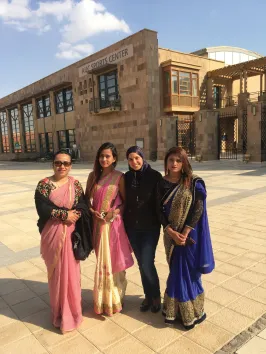 Students from Nepal standing on AUC's campus.
Students from Nepal standing on AUC's campus.
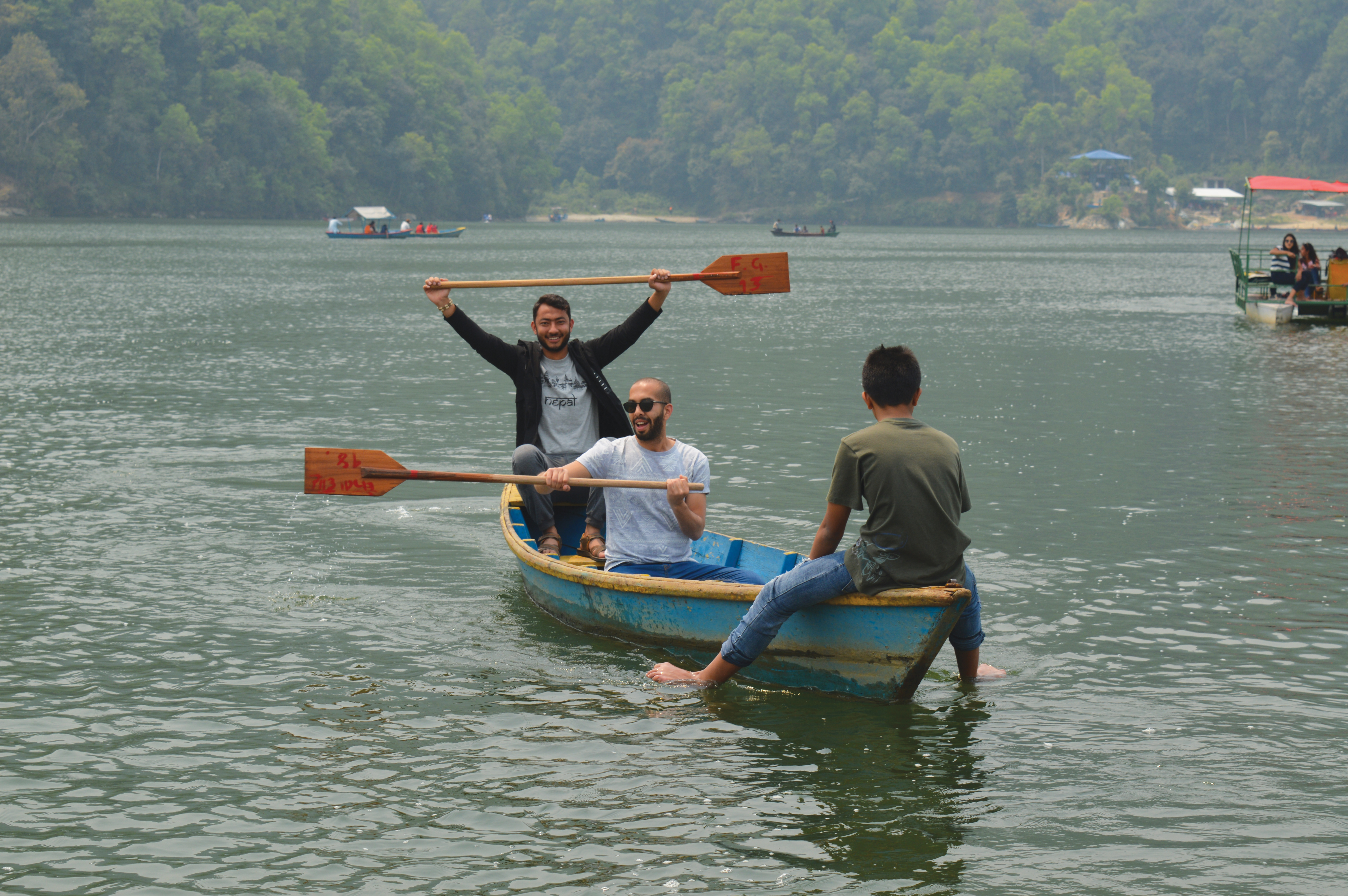
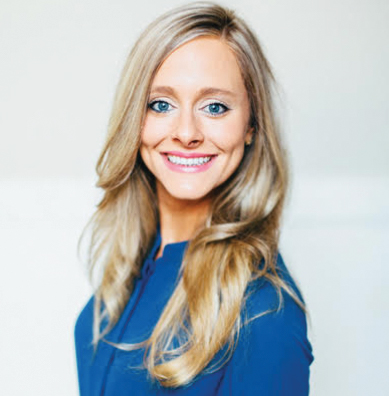
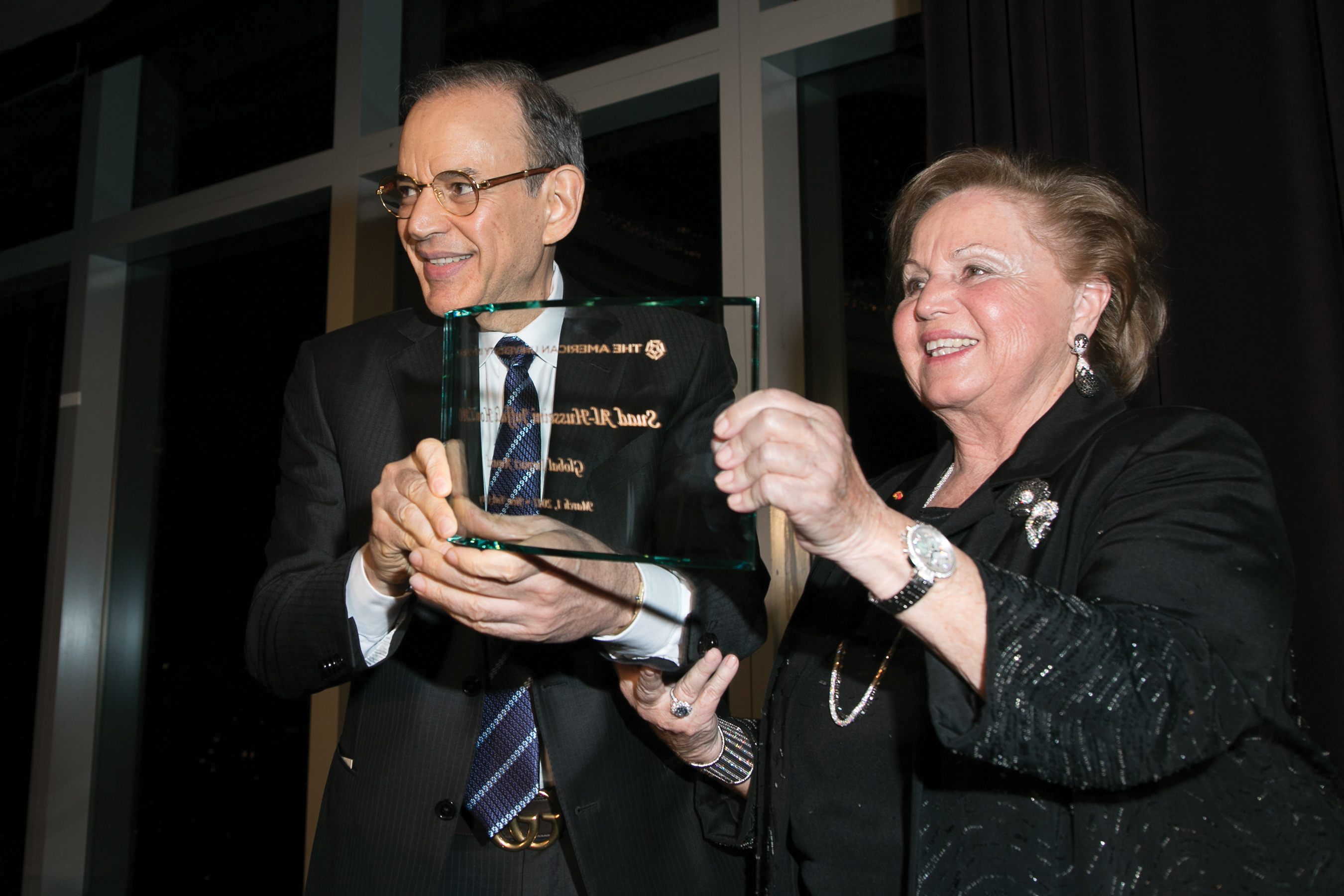
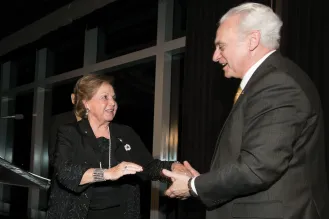 President Ricciardone with Juffali.
President Ricciardone with Juffali.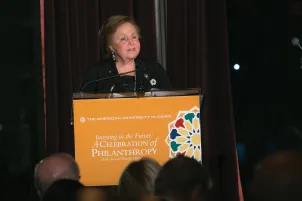 Juffali making a speech at the benefit dinner
Juffali making a speech at the benefit dinner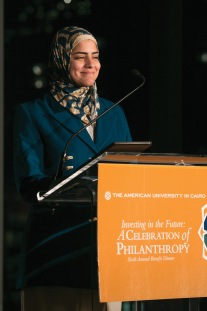 Reehab Elhoubba Ramadam (MA '17) makes a speech at the benefit dinner.
Reehab Elhoubba Ramadam (MA '17) makes a speech at the benefit dinner.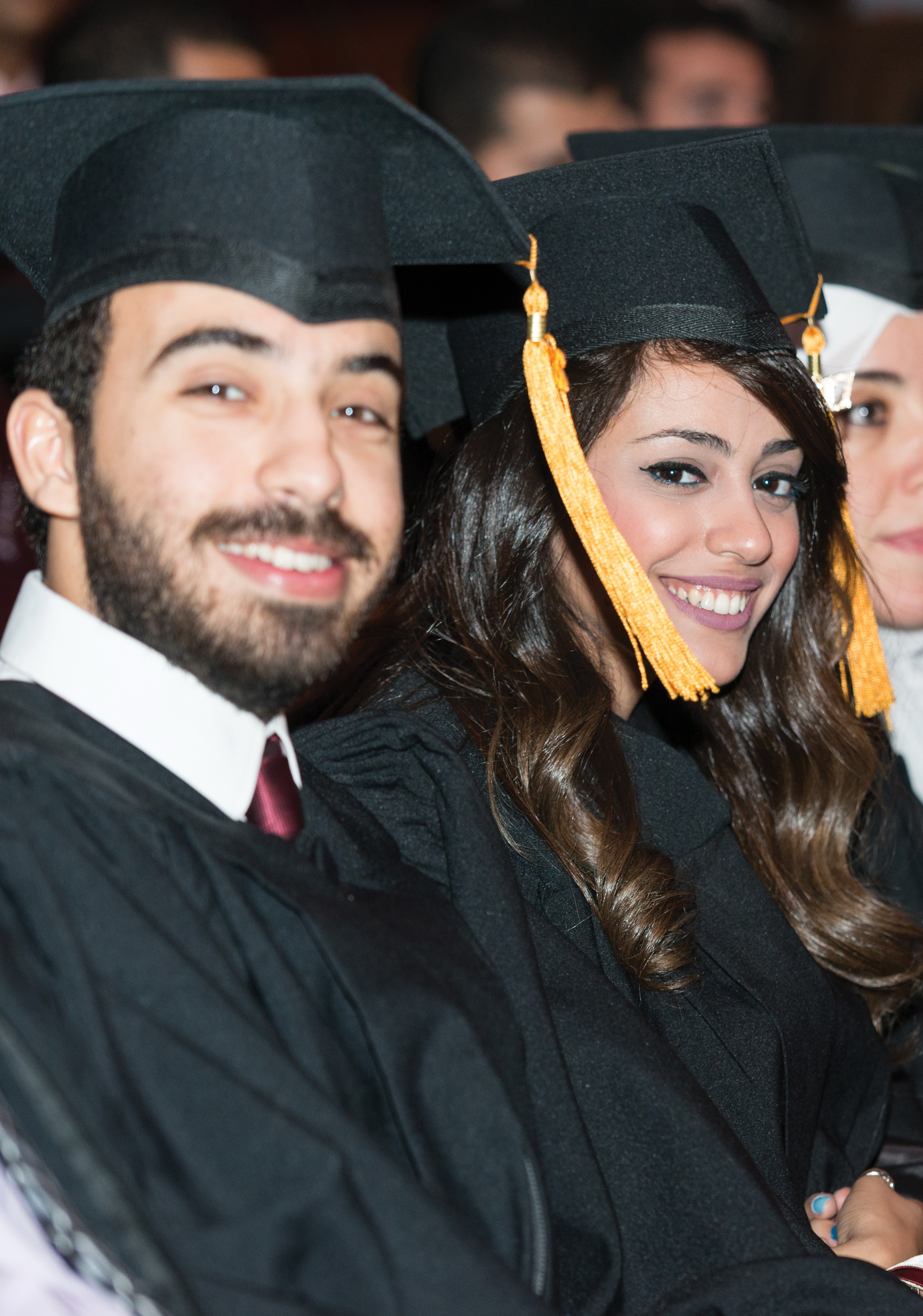
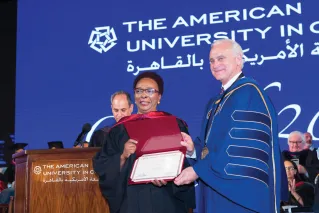 President Francis Ricciardone with Doris Jones.
President Francis Ricciardone with Doris Jones.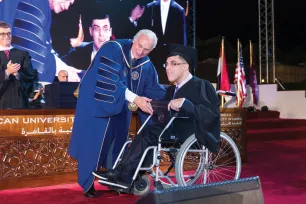
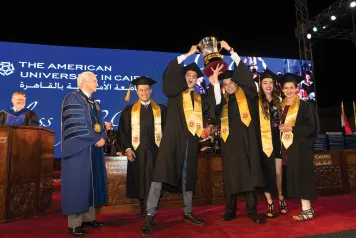 Ali Assem Shaltout, a double major in mechanical engineering and accounting and recipient of the Parents Association Cup, addressed students as the representative of the undergraduate class. He shared, "AUC had us experience how life works because it was all about the small choices. It was all about the laps we raced and the laps we skipped. It was all about the challenges we chose to experience while knowing that we have so little control over the process."
Ali Assem Shaltout, a double major in mechanical engineering and accounting and recipient of the Parents Association Cup, addressed students as the representative of the undergraduate class. He shared, "AUC had us experience how life works because it was all about the small choices. It was all about the laps we raced and the laps we skipped. It was all about the challenges we chose to experience while knowing that we have so little control over the process."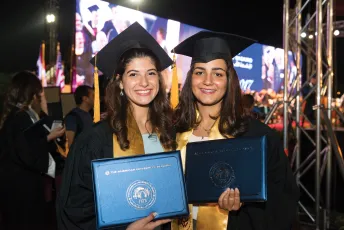 Al Ghurair, too, encouraged students to be active and begin contributing to their communities as early as possible. "Class of 2017, you are among the best positioned young people in our region," he affirmed. "I urge you to begin your journey of giving early. Volunteer your time to a great cause, be ambassadors for education, mentor a younger person with potential or invent a tech solution for a challenge that affects someone you love. Just please start early."
Al Ghurair, too, encouraged students to be active and begin contributing to their communities as early as possible. "Class of 2017, you are among the best positioned young people in our region," he affirmed. "I urge you to begin your journey of giving early. Volunteer your time to a great cause, be ambassadors for education, mentor a younger person with potential or invent a tech solution for a challenge that affects someone you love. Just please start early."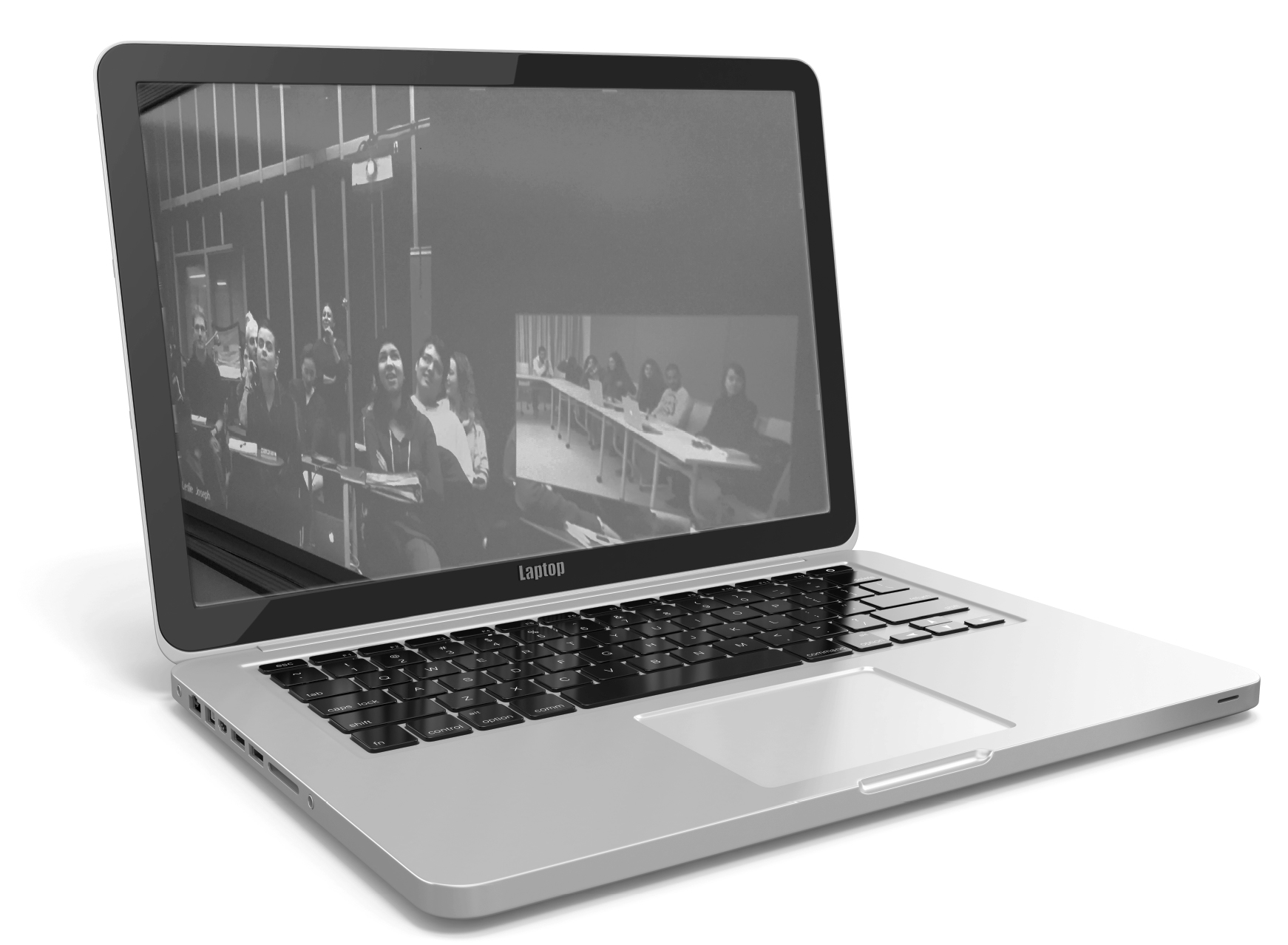
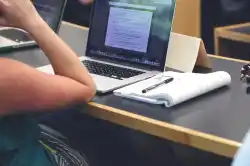 A joint course between AUC and Oberlin College utilized video conferencing technology as a tool to bring AUC students from their classroom in Cairo together with their peers in an Ohio classroom to exchange and debate ideas.
A joint course between AUC and Oberlin College utilized video conferencing technology as a tool to bring AUC students from their classroom in Cairo together with their peers in an Ohio classroom to exchange and debate ideas.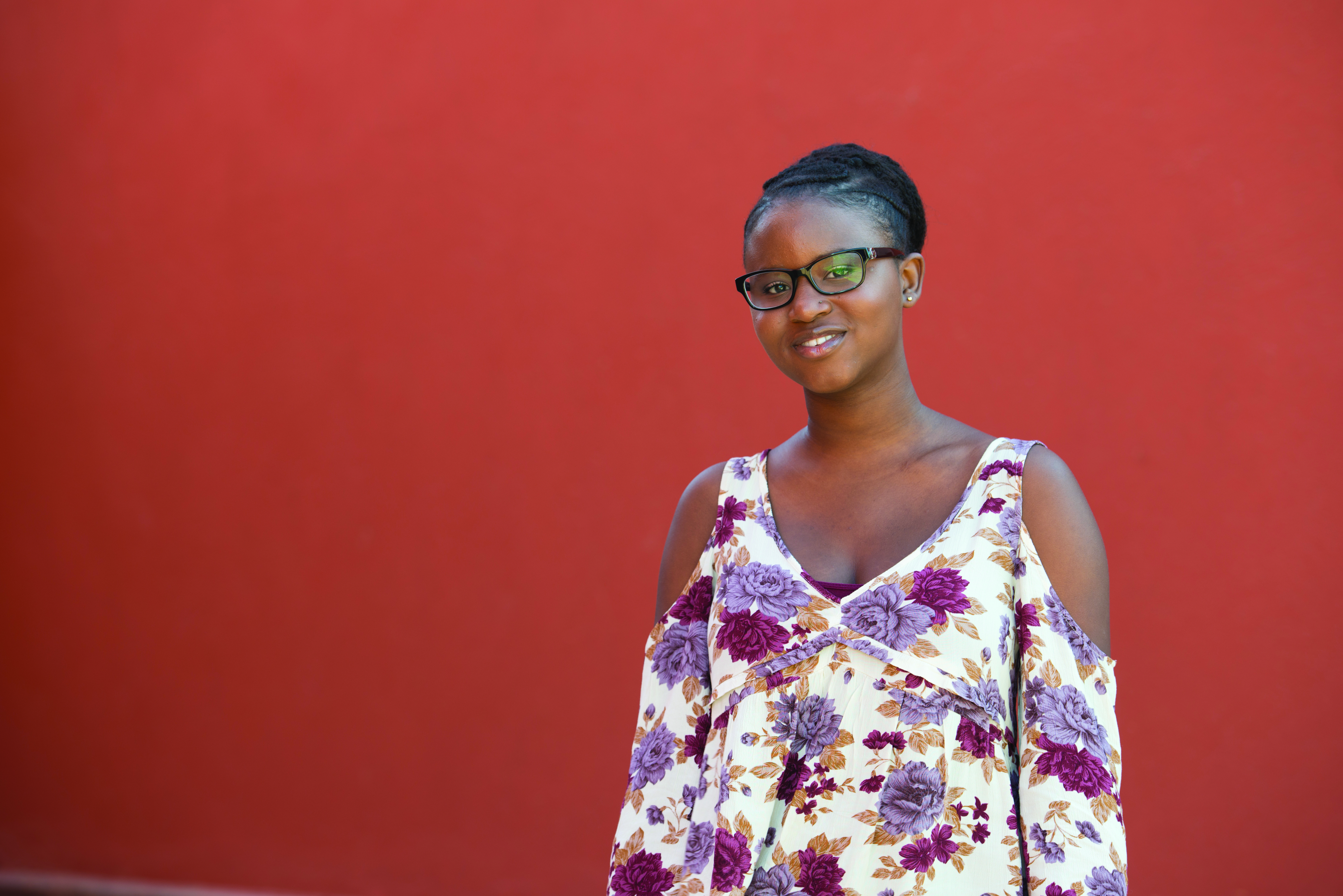
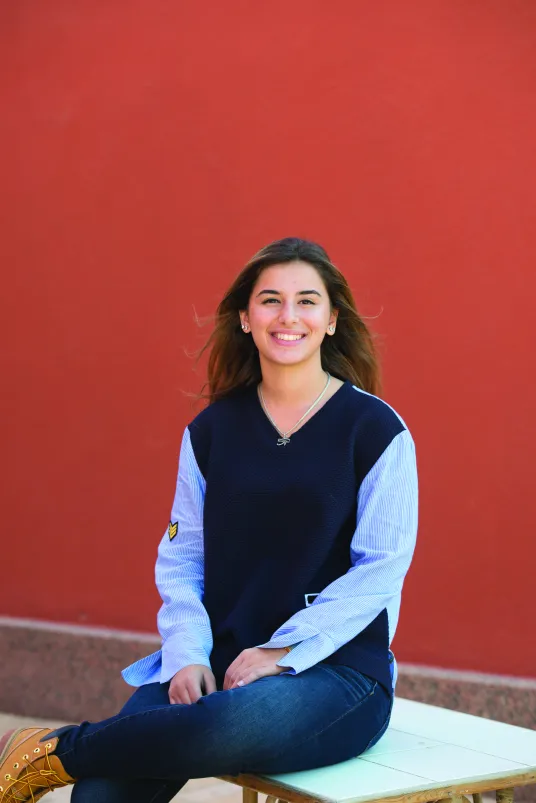 "I was tired of proclaiming that I was Egyptian without experiencing Egypt, so I came to Cairo to reconnect with my roots. Since I came here, I've learned that Egypt is an overlooked gem that offers valuable life lessons. Above all, I've learned the importance of family. One of my favorite memories was AUC's Thanksgiving dinner because it showed how different cultures could blend into one, not to mention the delicious food. Egypt is also a very collectivist culture. If I'm experiencing trouble, whether it be car issues or confusion about an assignment, someone will always go out of their way to help me, with no expectations in return. This has given me the most wonderful, wholesome feeling of joy and belongingness. Now, I aspire to become a mentor to younger students."
"I was tired of proclaiming that I was Egyptian without experiencing Egypt, so I came to Cairo to reconnect with my roots. Since I came here, I've learned that Egypt is an overlooked gem that offers valuable life lessons. Above all, I've learned the importance of family. One of my favorite memories was AUC's Thanksgiving dinner because it showed how different cultures could blend into one, not to mention the delicious food. Egypt is also a very collectivist culture. If I'm experiencing trouble, whether it be car issues or confusion about an assignment, someone will always go out of their way to help me, with no expectations in return. This has given me the most wonderful, wholesome feeling of joy and belongingness. Now, I aspire to become a mentor to younger students."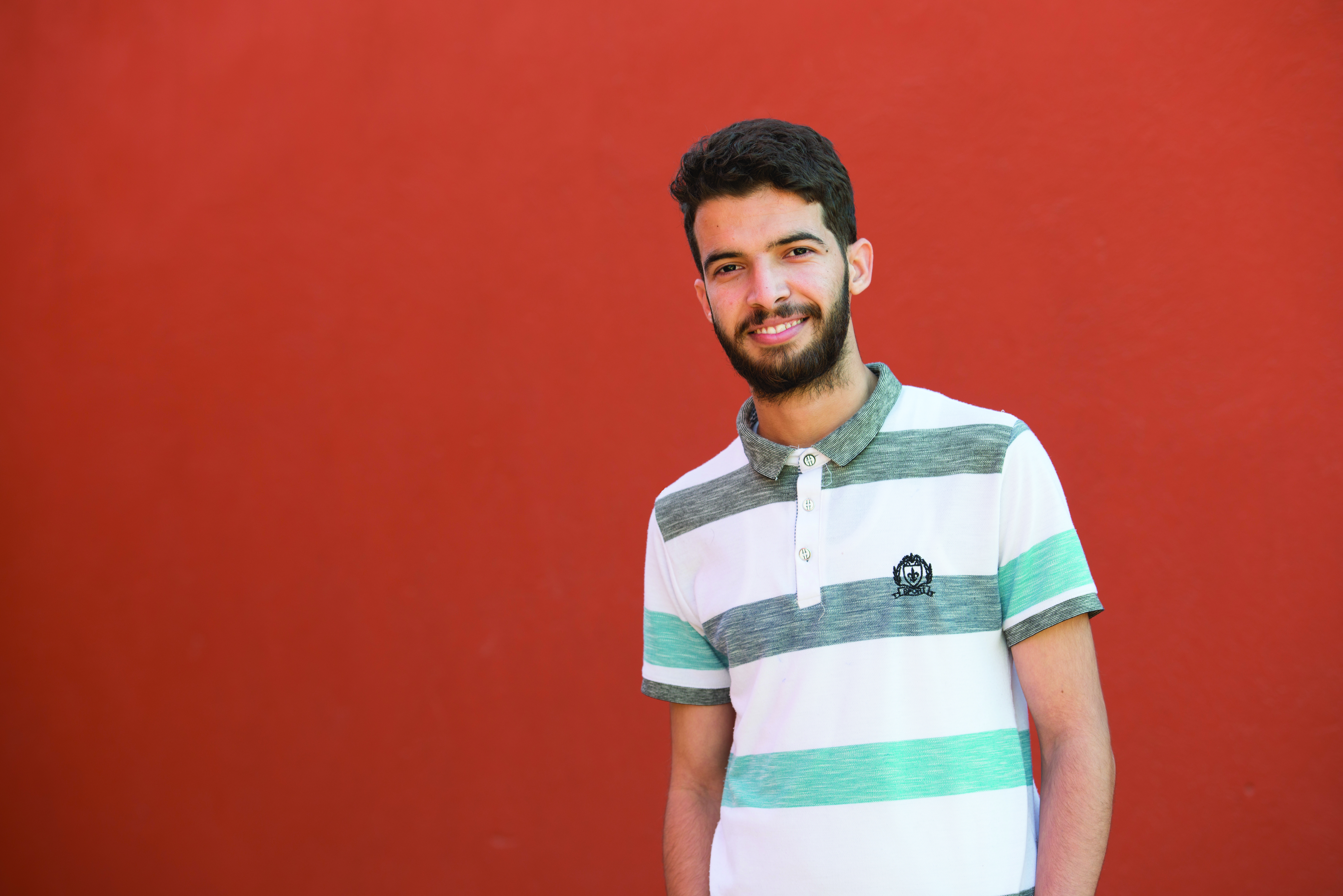 "Egypt has its own legacy, which encouraged me to step into this country and sense the historical dimensions inside its walls. Being in such an environment is priceless because you don't get the chance to walk and learn in a place that was -- hundreds of years ago -- a hub of the most brilliant minds in history, those who changed the path of science forever. Through community service clubs at AUC, I went to rural areas in Egypt to teach children math, Arabic and English using games. I am also working with the Robotix Club to teach basic robotics to impoverished children with disabilities. AUC stands for quality. I see motivation wherever I go: students eager to make a change and enthusiastic about doing something great for their communities."
"Egypt has its own legacy, which encouraged me to step into this country and sense the historical dimensions inside its walls. Being in such an environment is priceless because you don't get the chance to walk and learn in a place that was -- hundreds of years ago -- a hub of the most brilliant minds in history, those who changed the path of science forever. Through community service clubs at AUC, I went to rural areas in Egypt to teach children math, Arabic and English using games. I am also working with the Robotix Club to teach basic robotics to impoverished children with disabilities. AUC stands for quality. I see motivation wherever I go: students eager to make a change and enthusiastic about doing something great for their communities."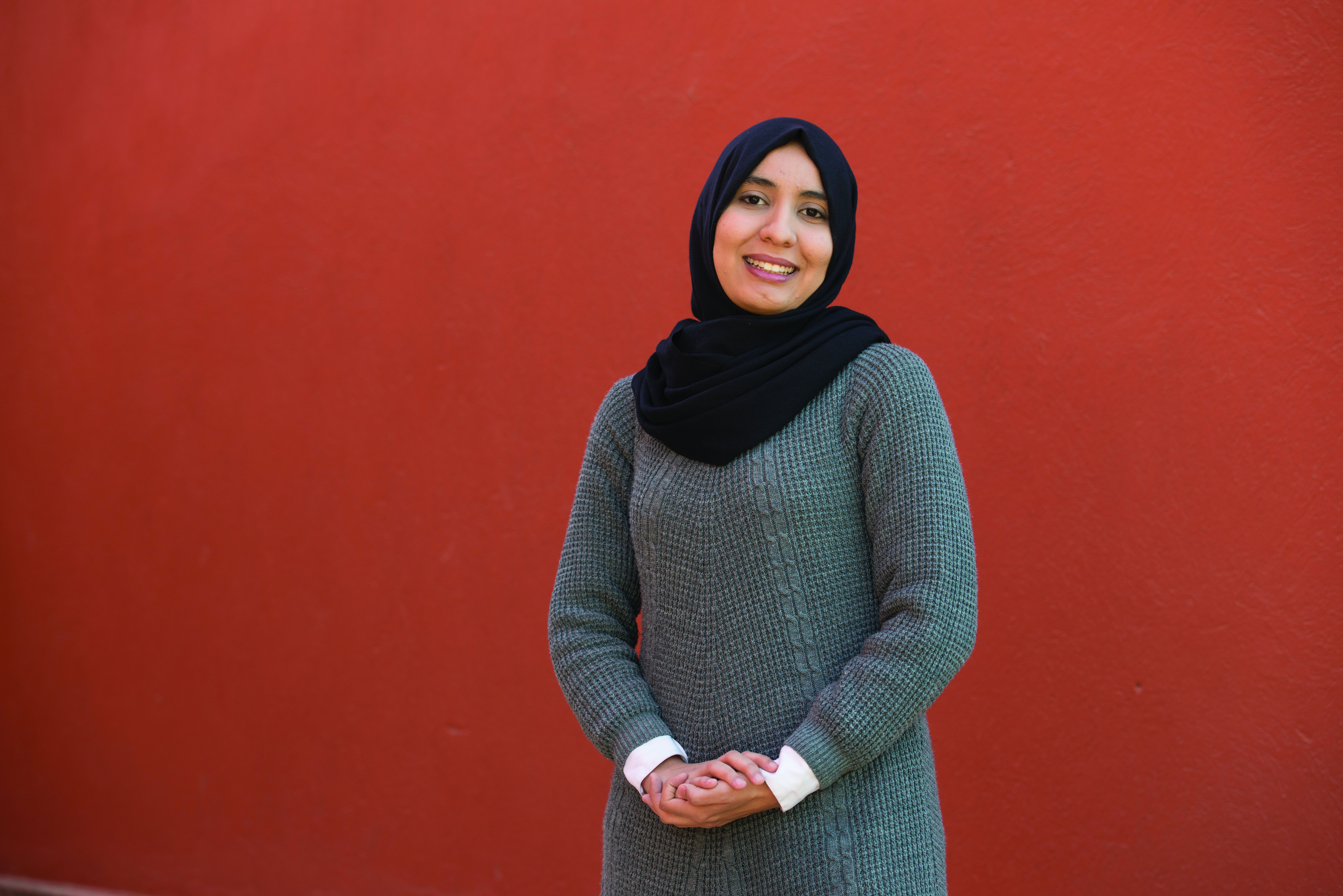 "As an AUCian, I feel like a citizen of an important place where the unreachable is right at my fingertips. At AUC conferences and events, we network with amazing leaders who listen to our ideas because they believe we matter. This gives me a sense of empowerment. Another thing I adore about AUC is the welcoming and friendly Office of International Student Life, where I feel at home and valued because of my different background. The office ensures that we as international students see the beauty of Egypt by escorting us to different places in the country and organizing heartwarming gatherings. Egyptians love us here and always offer to accommodate."
"As an AUCian, I feel like a citizen of an important place where the unreachable is right at my fingertips. At AUC conferences and events, we network with amazing leaders who listen to our ideas because they believe we matter. This gives me a sense of empowerment. Another thing I adore about AUC is the welcoming and friendly Office of International Student Life, where I feel at home and valued because of my different background. The office ensures that we as international students see the beauty of Egypt by escorting us to different places in the country and organizing heartwarming gatherings. Egyptians love us here and always offer to accommodate."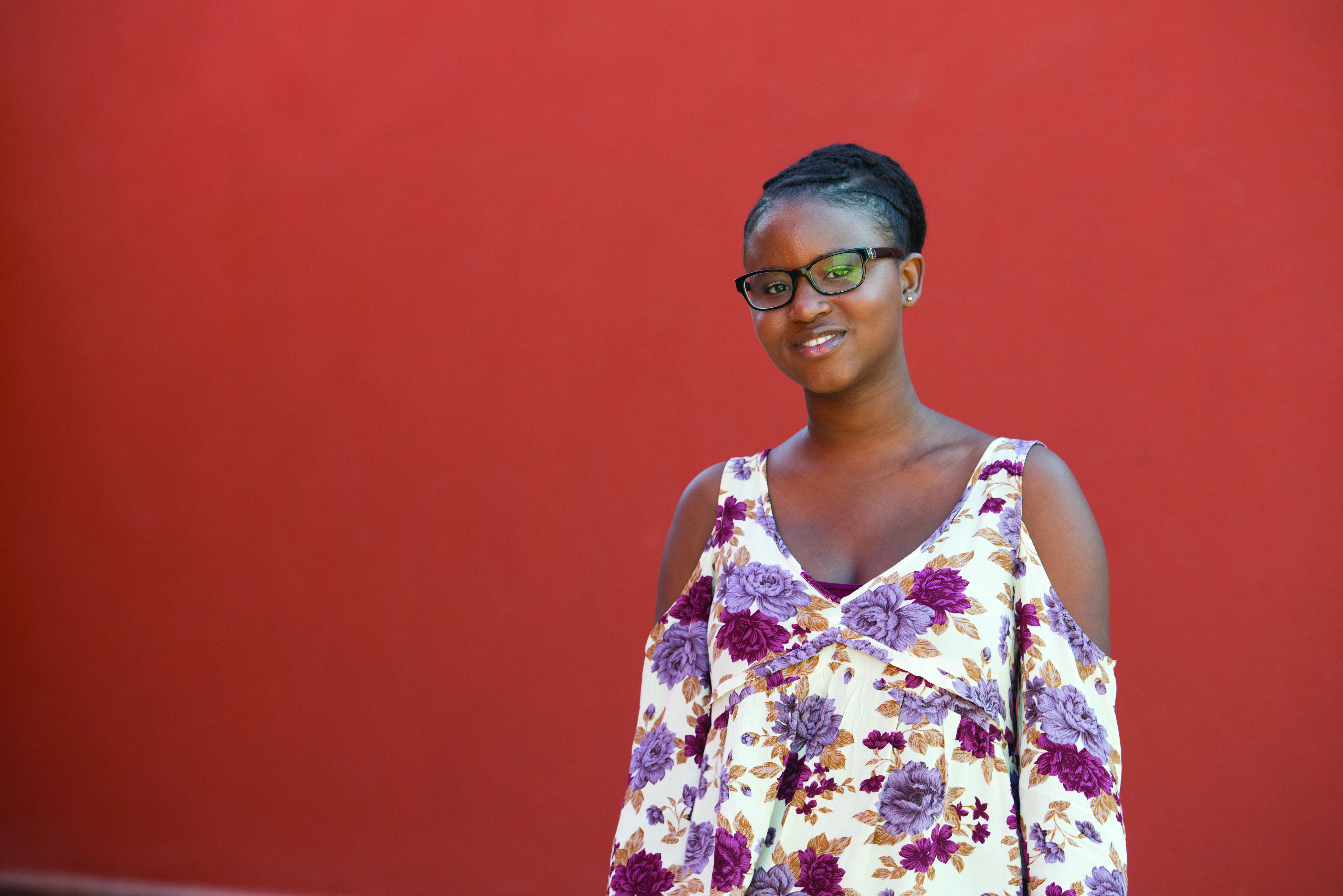 "I grew up in West Africa and wanted to come back to the continent, but somewhere completely different from where I grew up. I've always been interested in doing this; I just never had the chance to venture out on my own and explore. It's a nice dual experience to be at AUC as a student and experience how things work academically, as well as be a tourist in Egypt. I'm getting a unique historical perspective. Because we're in Egypt, my professors are using works that relate more to the area, so I'm being introduced to different theorists and authors."
"I grew up in West Africa and wanted to come back to the continent, but somewhere completely different from where I grew up. I've always been interested in doing this; I just never had the chance to venture out on my own and explore. It's a nice dual experience to be at AUC as a student and experience how things work academically, as well as be a tourist in Egypt. I'm getting a unique historical perspective. Because we're in Egypt, my professors are using works that relate more to the area, so I'm being introduced to different theorists and authors."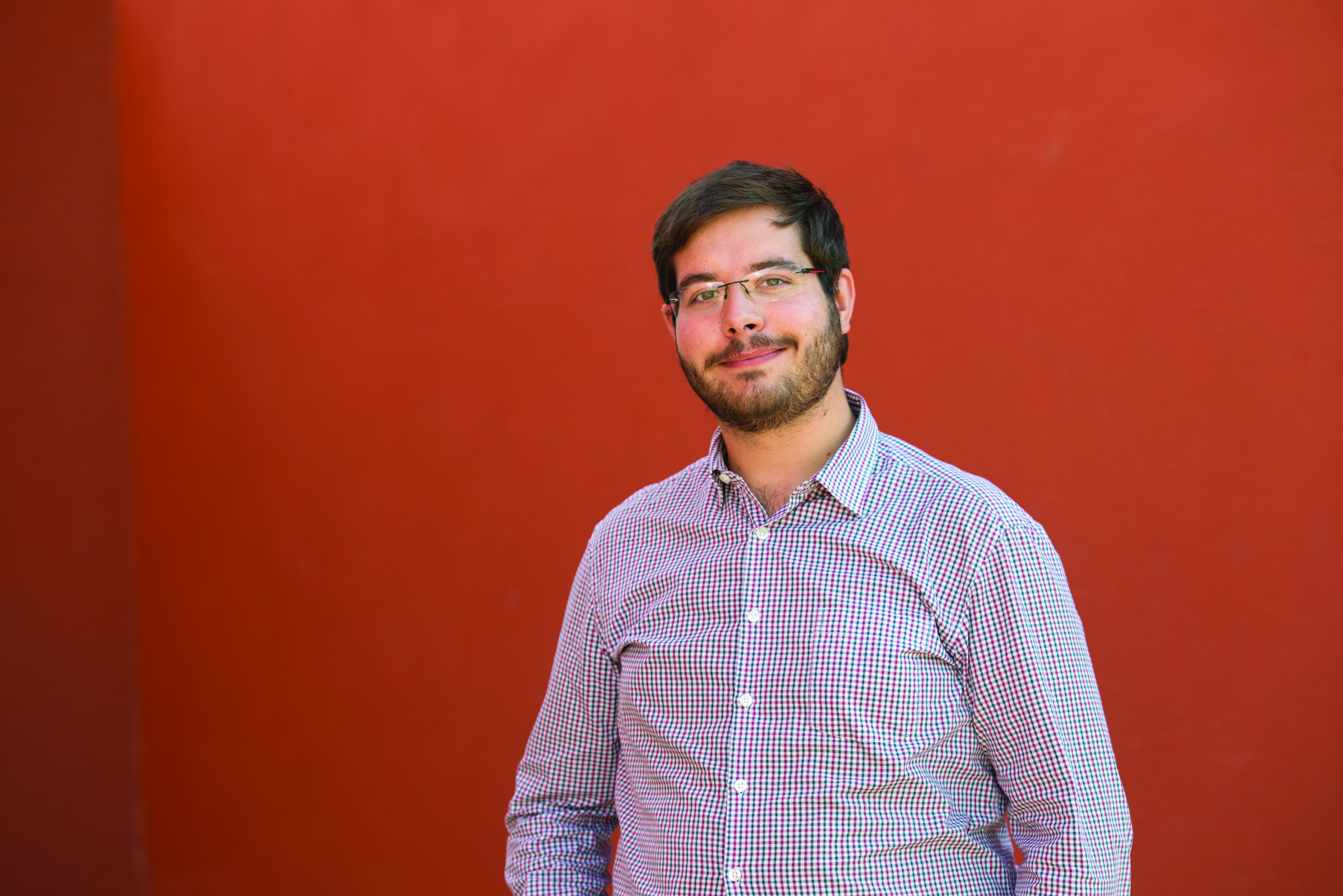 "Egypt is rich in that it has so much to offer. There's an interesting mixture of cultures, and people always communicate different opinions. AUC, more than any other university, is a way of life, not just an educational institution. You can achieve many things and interact with important and interesting individuals. You come across different people on campus, with different ways of living and thinking. The University encourages multidisciplinary thinking, and people exchange a lot of ideas through courses. It's a very interesting melange of Egyptian, American and European academic traditions"
"Egypt is rich in that it has so much to offer. There's an interesting mixture of cultures, and people always communicate different opinions. AUC, more than any other university, is a way of life, not just an educational institution. You can achieve many things and interact with important and interesting individuals. You come across different people on campus, with different ways of living and thinking. The University encourages multidisciplinary thinking, and people exchange a lot of ideas through courses. It's a very interesting melange of Egyptian, American and European academic traditions"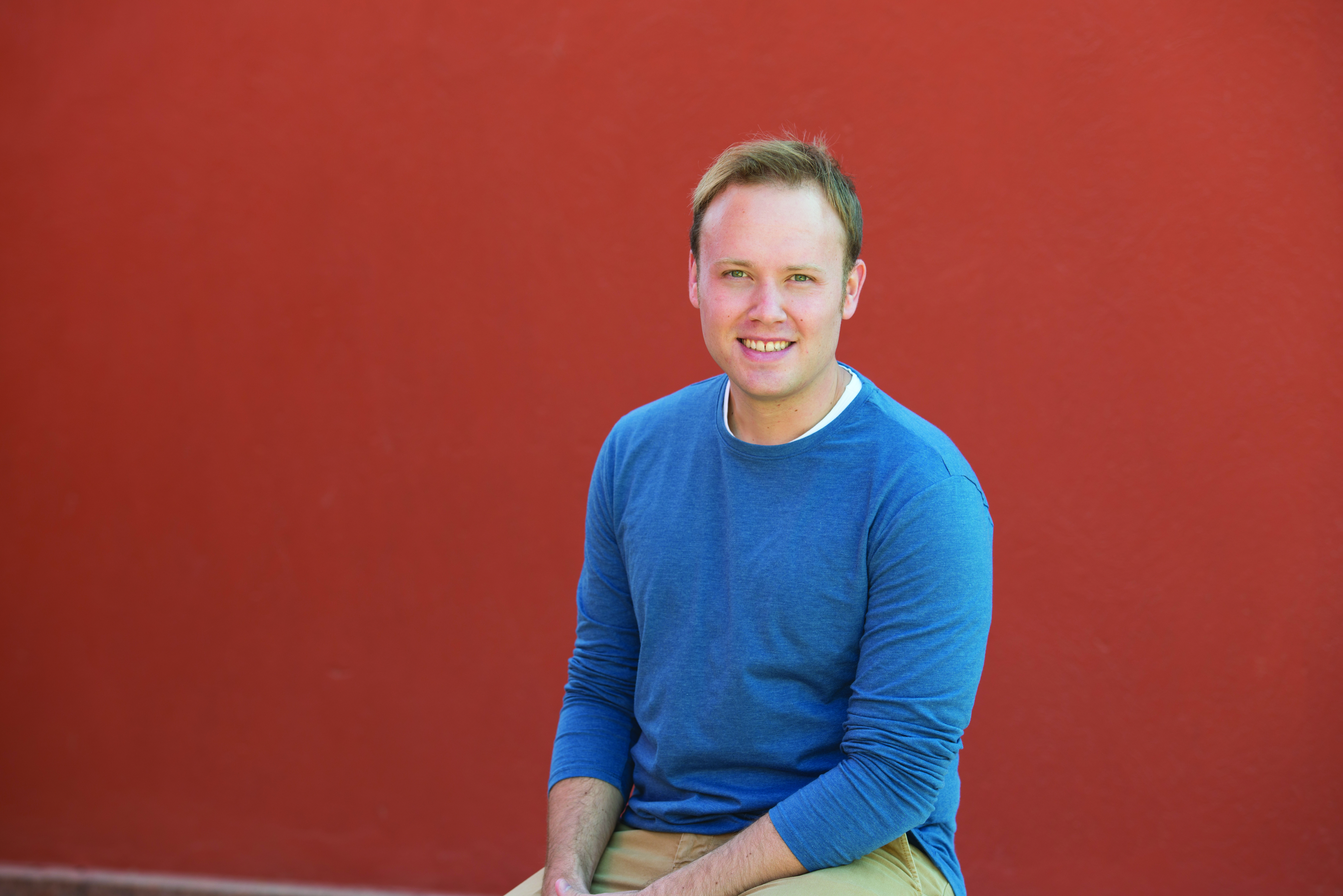 "AUC offers opportunities and a unique learning experience that you would not be able to get in other countries. I'm learning here within an interesting economic situation. My goal is to tackle the class gap to really structure a strong middle class. The University is helping me achieve this goal because it really brings about a new perspective and pushes you to innovate. I've learned so much about myself and where I come from because of the Egyptian society's collective unity. This kind of networking is at the forefront of global business."
"AUC offers opportunities and a unique learning experience that you would not be able to get in other countries. I'm learning here within an interesting economic situation. My goal is to tackle the class gap to really structure a strong middle class. The University is helping me achieve this goal because it really brings about a new perspective and pushes you to innovate. I've learned so much about myself and where I come from because of the Egyptian society's collective unity. This kind of networking is at the forefront of global business." 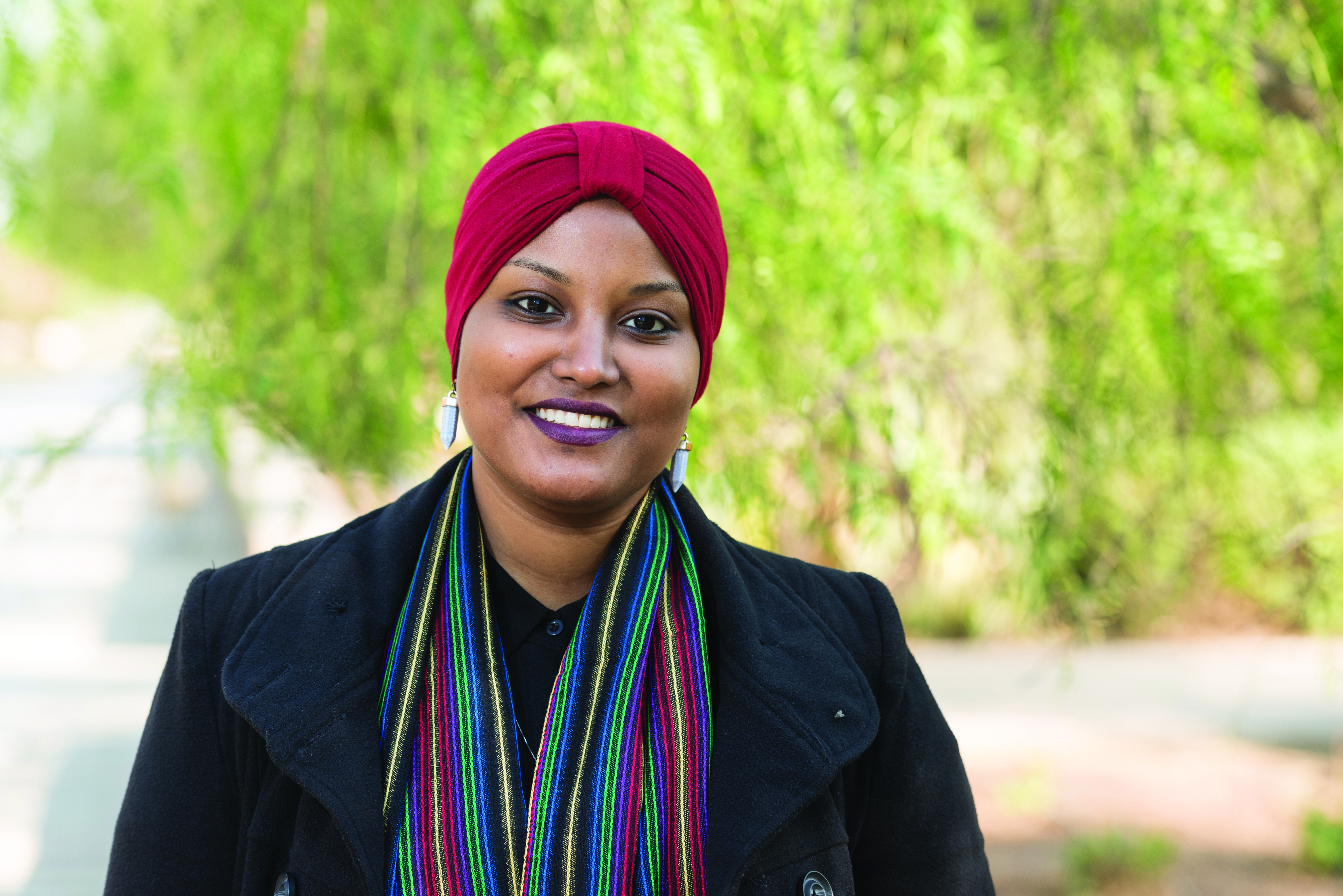

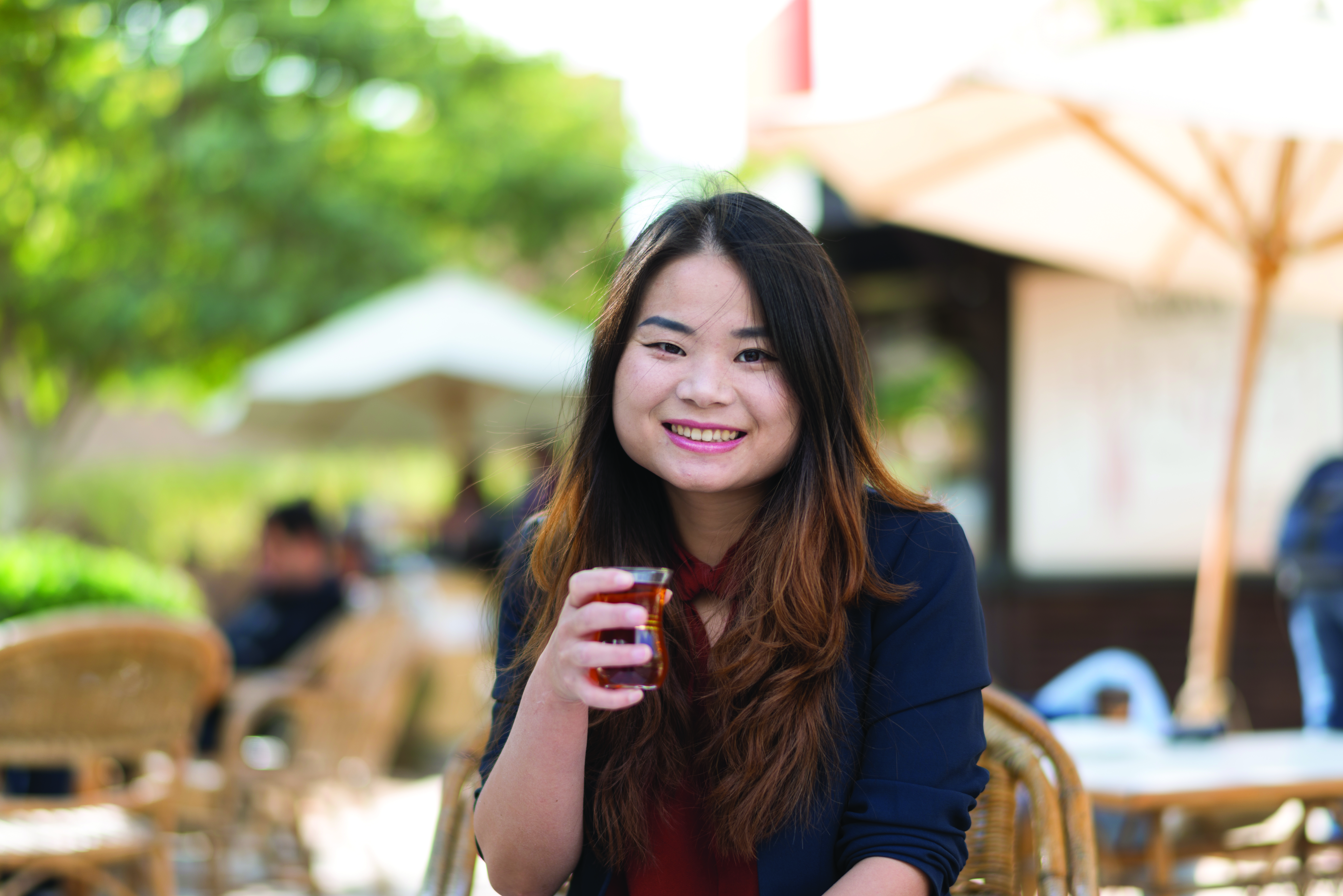
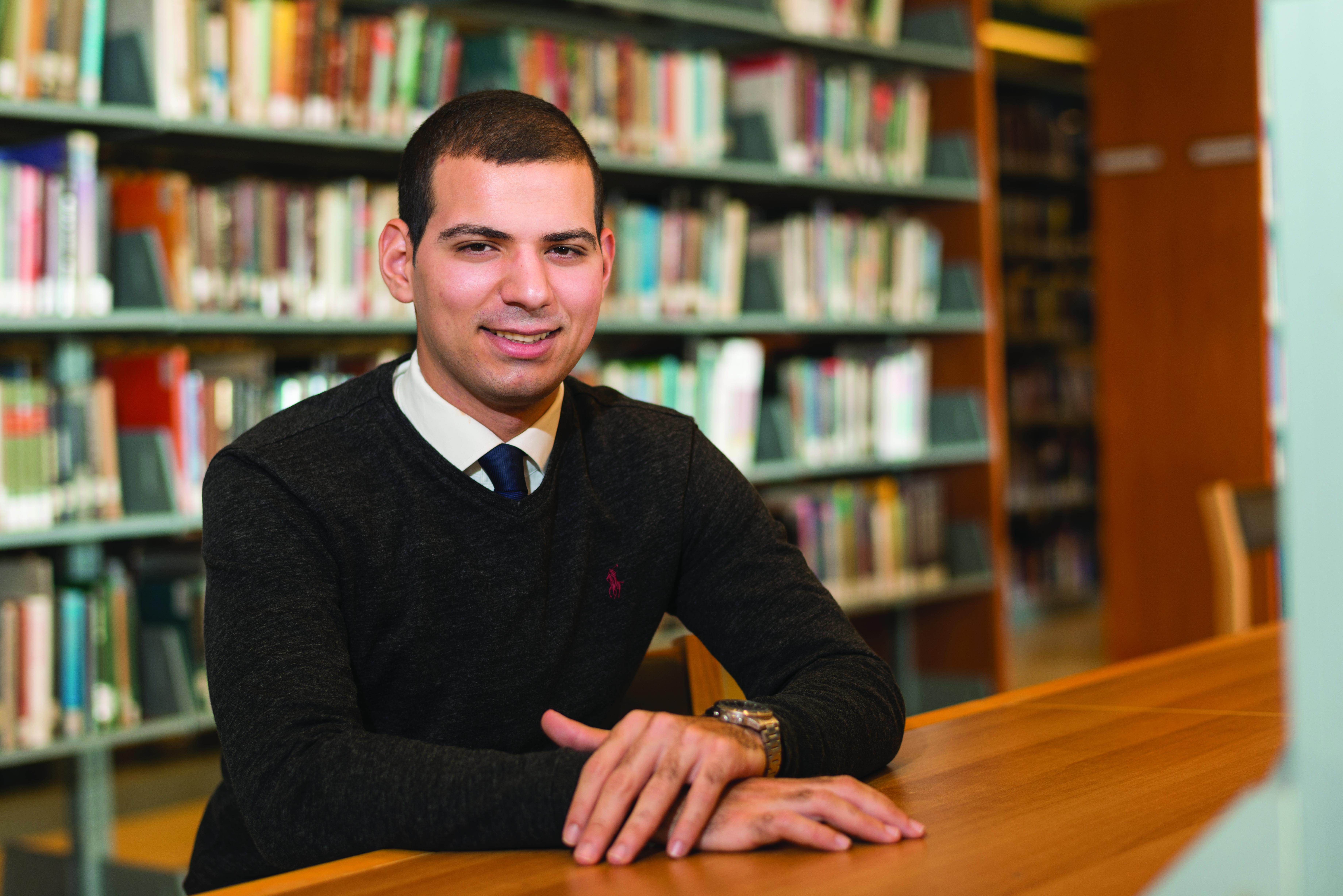
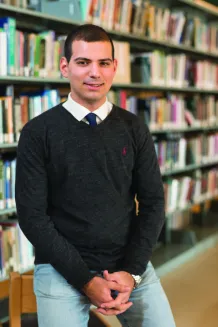
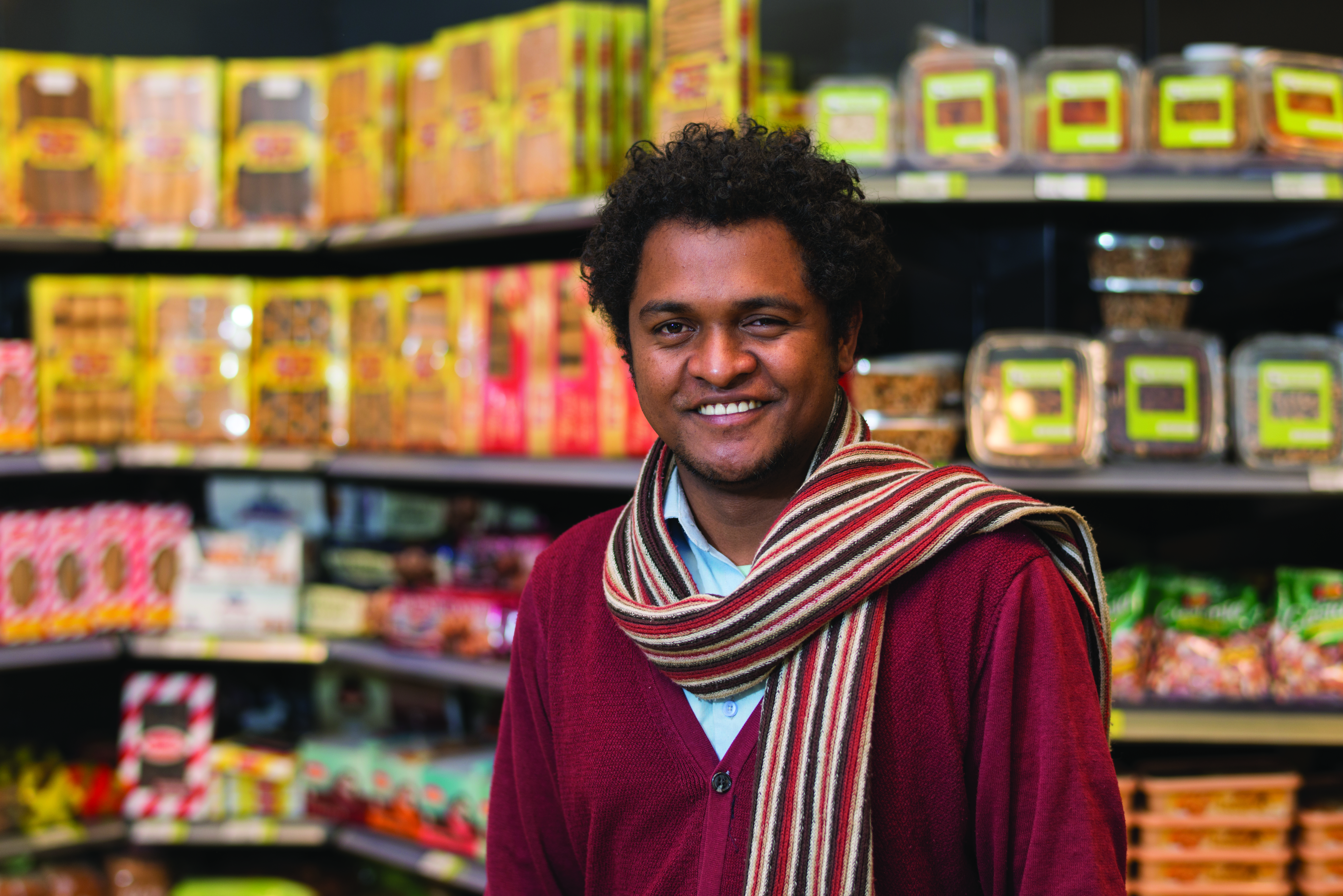
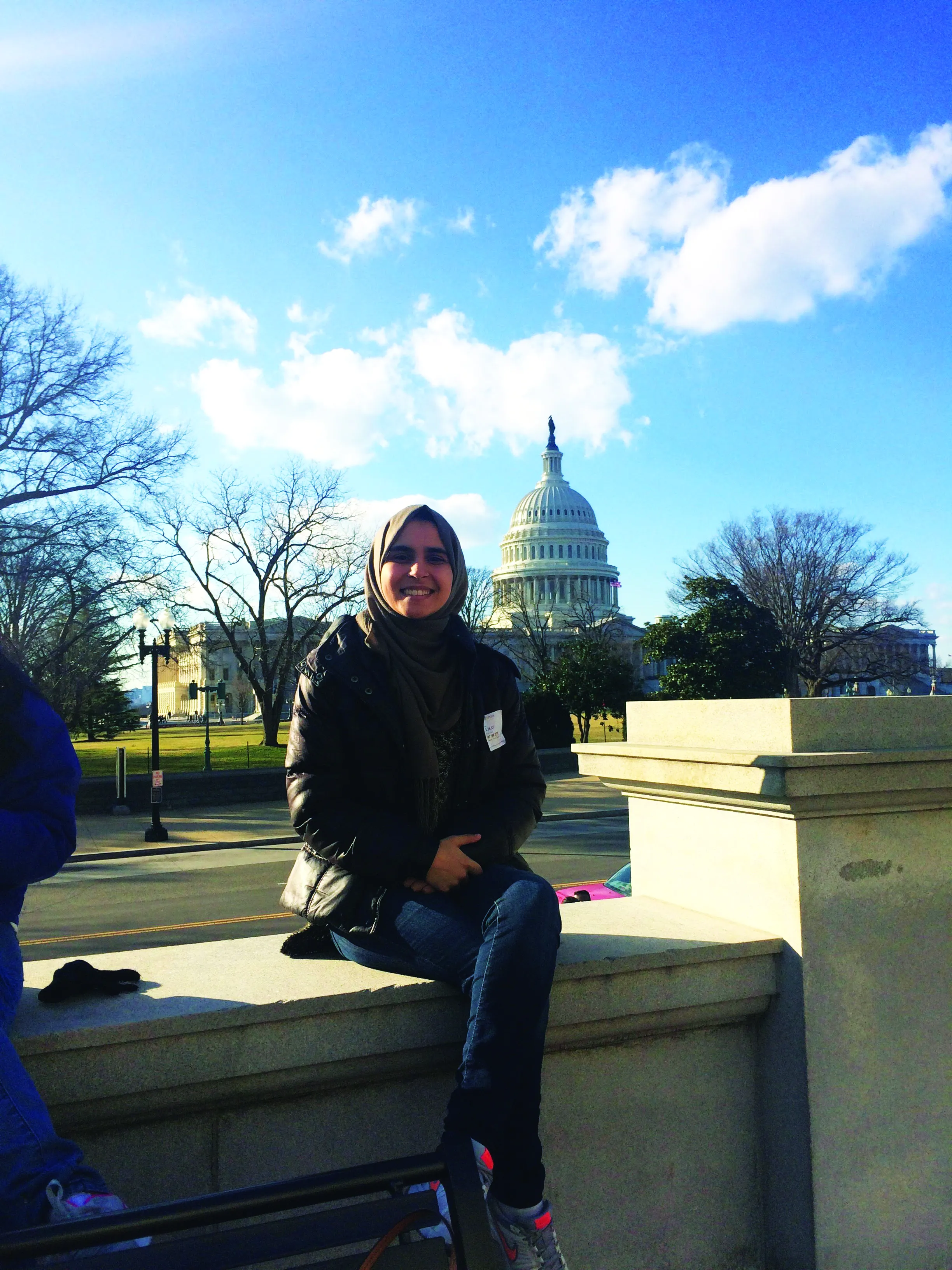
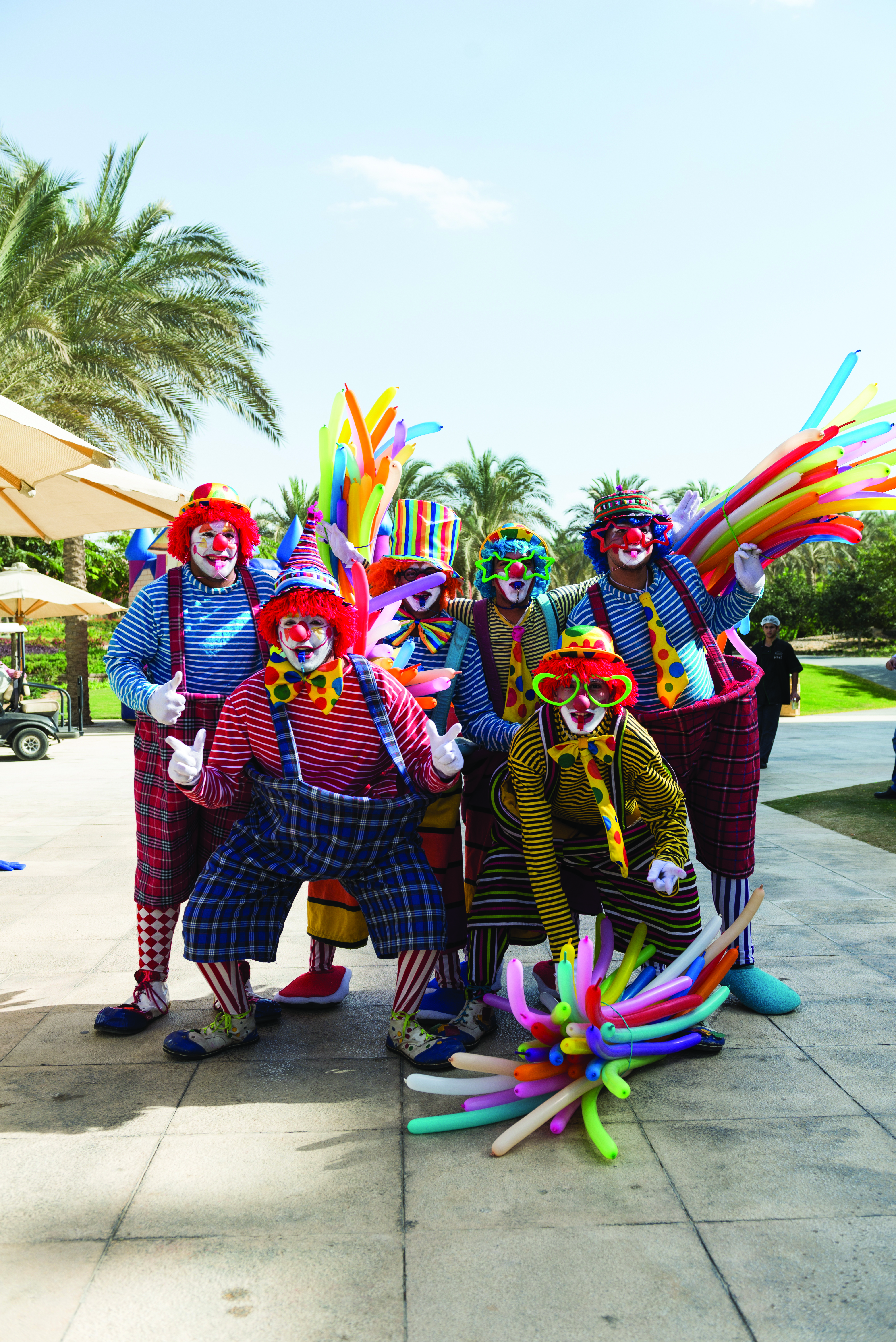
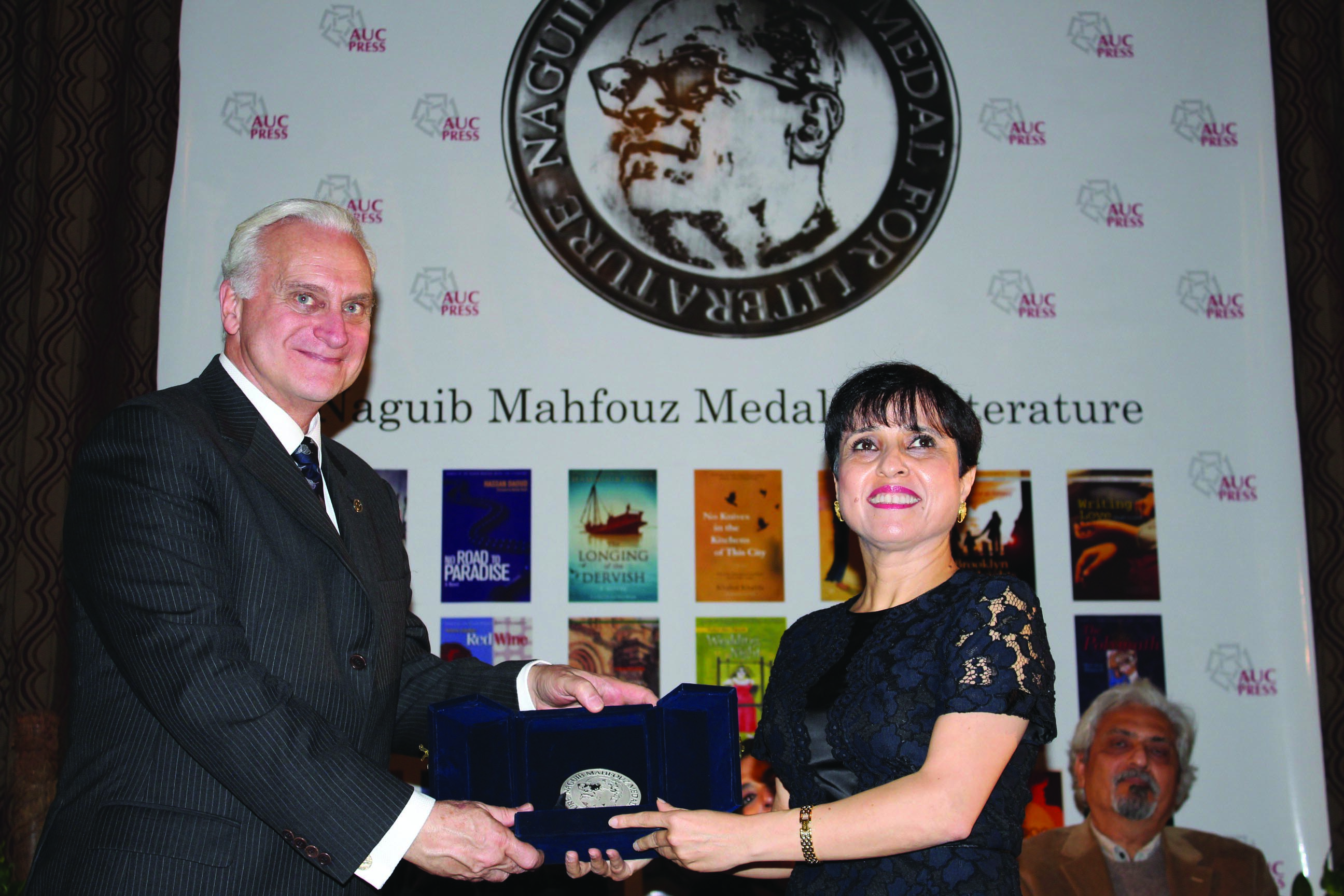
 New Provost Ehab Abdel-Rahman
New Provost Ehab Abdel-Rahman Rania Al-Mashat '95 is Egypt's new Minister of Tourism.
Rania Al-Mashat '95 is Egypt's new Minister of Tourism. William B. Inglee is the senior partner and cofounder of Inglee Sauer Moseley Strategies.
William B. Inglee is the senior partner and cofounder of Inglee Sauer Moseley Strategies. Tarek Masoud is a professor of public policy and the Sultan of Oman professor of international relations at Harvard University's John F. Kennedy School of Government.
Tarek Masoud is a professor of public policy and the Sultan of Oman professor of international relations at Harvard University's John F. Kennedy School of Government. Dr. Hatem has had an extensive career in the field of medicine and nonprofit medical administration.
Dr. Hatem has had an extensive career in the field of medicine and nonprofit medical administration. Author Huzama Habayeb's novel Mukhmal, or Velvet, won the 2017 prestigious award.
Author Huzama Habayeb's novel Mukhmal, or Velvet, won the 2017 prestigious award. AUC launched the University Centers for Career Development project at a formal breakfast with the stakeholders.
AUC launched the University Centers for Career Development project at a formal breakfast with the stakeholders. President Francis Ricciardone with Udacity COO Clarissa Shen at the project's launch event.
President Francis Ricciardone with Udacity COO Clarissa Shen at the project's launch event. President Francis Ricciardone with representatives from Luqman Weise Capital shortly after signing the memorandum.
President Francis Ricciardone with representatives from Luqman Weise Capital shortly after signing the memorandum.